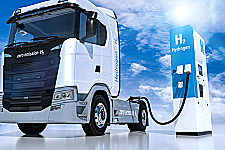Paving the way for refrigerated transport by hydrogen-fuelled trucks

Many people have identified heavy goods vehicles with hydrogen-powered electric engines as a forward-looking solution. However, as of today, no such vehicles are on the market, and no-one knows in what conditions this driveline will be more advantageous than battery-powered cars.
The Institute for Shipping Economics and Logistics (ISL), Bremerhaven University of Applied Sciences and akquinet port consulting GmbH are producing a concept study entitled H2cool Prelude to prepare the refitting and operation of large refrigerated trucks powered by electricity generated from hydrogen. The intention is to use this study to attract supra-regional funding to refit an existing truck and operate it on a pilot basis.
The transport of freight using fuel from fossil sources is on the way out. Climate change, pollution and excessive use of resources are resulting in an urgent search for new, environmentally friendly alternatives. Hydrogen is a potential fuel for the future. The new H2Cool Prelude project at Bremerhaven University of Applied Sciences is investigating how this can be used in future for trucks transporting frozen goods.
H2Cool Prelude project is being worked on by the Institute for Shipping Economics and Logistics (ISL), Bremerhaven University of Applied Sciences and akquinet port consulting GmbH, focusing on the specific case of a truck transporting refrigerated and frozen goods which is powered by electricity generated from hydrogen. The intention is to use this study to attract supra-regional funding to refit an existing truck and operate it on a pilot basis.
The truck that will be the subject of the study is a 40-tonne articulated lorry with a 480-horsepower tractor unit and a cooling trailer that can accommodate 33 Euro pallets. No trucks of this size which meet the technical requirements are currently on the market. Also, no battery-powered or hydrogen-powered refrigeration units are available. In addition to the technical concept for the hydrogen-operated refrigerated truck, the project is also looking at overarching issues regarding the design of a pilot phase, estimates of the reduced environmental impact, and cost analyses.
The study is also considering the requirements to be met if such a vehicle is to enter day-to-day use. These include the training of drivers and workshop staff and the legal framework needed for a successful introduction of the technology into the commercial world.
The project is being financed with funding from the European Union and the State of Bremen, the Senator for Climate Action, Environment, Mobility, Urban Development and Housing, under the Applied Environmental Research (AUF) funding programme.

This project focus on climate an is supported by our hero Eco